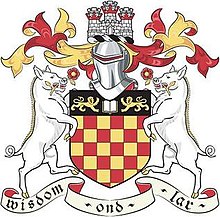University of Winchester

Coat of arms of the University of Winchester
|
|
|
Former names
|
King Alfred's College |
|---|---|
| Motto | Wisdom ond lar (old English) |
|
Motto in English
|
Wisdom and Knowledge |
| Type | Public |
| Established | 1840 - Winchester Diocesan Training School 1847 - Winchester Training College 1928 - King Alfred's College 2005 - University of Winchester |
| Chancellor | Alan Titchmarsh |
| Vice-Chancellor | Joy Carter |
|
Administrative staff
|
650 |
| Students | 7,485 (2014/15) |
| Undergraduates | 5,910 (2014/15) |
| Postgraduates | 1,575 (2014/15) |
| Location | Winchester, Hampshire, England |
| Campus | Semi-urban |
| Colours | |
| Affiliations |
Guild HE Cathedrals Group |
| Website | www |
 |
|
|
Complete (2017, national) |
74 | |
|---|---|---|
|
The Guardian (2017, national) |
63 | |
|
Times/Sunday Times (2017, national) |
57 | |
The University of Winchester is a public research university based in the city of Winchester, Hampshire, England. The university has origins tracing back to 1840.
Ranked 10th for teaching excellence in The Times and The Sunday Times 2016 Good University Guide and fourth for student satisfaction in England in the National Student Survey 2015, the university continues to further strengthen its position as a top provider of higher education.
Every year the University holds its graduation ceremonies in Winchester Cathedral. Winchester is a historic cathedral city and the ancient capital of Wessex and the Kingdom of England.
The origins of the University of Winchester date back to 1840 when the Winchester Diocesan Training School was founded as a Church of England foundation for the training of elementary schoolmasters. The school was initially quite small, located in a house at 27 St Swithun Street, Winchester. In 1847 the school moved to Wolvesey, the Bishop’s Palace, where it became Winchester Training College. Following an outbreak of cholera at Wolvesey a new building (now the main building on the university's King Alfred Campus) was established for the college in 1862, on land granted by the cathedral at West Hill, Winchester. The college was renamed King Alfred's College in 1928.
King Alfred's College trained thousands of teachers, at first men only, and then women too from 1960 onwards. Following changes in UK government policy towards further and higher education in the early 1970s, the College looked for partners to merge with and also sought to diversify its provision. Its educational partner, the University of Southampton, was lukewarm about offering other degrees, and the College sought approval for its own BEd and then BA degrees from the Council for National Academic Awards (CNAA). Interdisciplinary degrees in History and English with Drama, Archaeology and American Studies were the first offered. Further programmes followed in the 1980s, but it was only when the college expanded in the early 1990s following CNAA approval for a modular degree programme that a large number of new fields of study grew at undergraduate level. At the same time Masters programmes were approved alongside an MEd programme. With the CNAA's demise in 1992, the College found itself once again accredited by the University of Southampton, resuming a partnership broken off 18 years earlier.
...
Wikipedia
